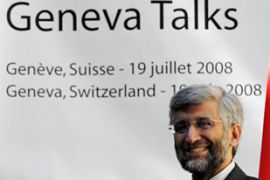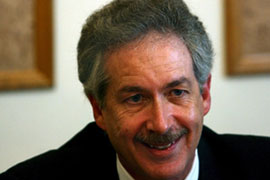Iran nuclear talks under way
Tehran’s refusal to freeze uranium enrichment casts doubt on value of Geneva talks.

Iran’s comments dampened hopes which had been raised by upbeat statements ahead of the talks, following Washington’s decision to send William Burns, the US under-secretary of state, as an observer.
‘Positive intentions’
Manouchehr Mottaki, Iran’s foreign minister, had said he hoped the meeting would be “positive and constructive”. While Saeed Jalili, Iran’s chief nuclear negotiator, spoke “positive intentions” when he arrived in Geneva on Friday.
On the European side, Christina Gallach, spokeswoman for Javier Solana, the EU’s diplomatic chief, said “the basis for successful negotiations is very substantial”.
“We are very flexible about how to work towards our expectations … we are ready to look at creative manners that allow negotiations to start,” she said.
A Western diplomat described the atmosphere of Saturday’s talks as “fine”, but confirmed that the Iranians were unwilling to address suspending uranium enrichment, or freezing it at current levels.
The US has repeatedly said that real negotiations can only begin after Tehran halts its nuclear work.
“That remains the US position and it will continue to be the US position,” Condoleezza Rice, the US secretary of state, said in Washington.
De-escalation ‘vital’
“We’ve seen a lot of resistance from various parties in the US to any escalation that may lead to a use of the military option against Iran,” Riad Kahwaji, who works for the Institute for Near East and Gulf Military Analysis in Dubai, told Al Jazeera.
“It’s become very vital for both sides to de-escalate to try and reach a solution.”
 |
|
The presence of Burns at the talks marks a policy shift for the US [EPA]
|
“Both sides are willing to make concessions but they’re trying to come up with a formula so that they don’t lose prestige in front of their own people or have to give up too many of their demands.”
The attendance of Burns, the number three official at the US state department, had widely trumpeted before the talks got under way, as a major policy shift by Washington, which has not had any diplomatic relations with Iran since 1980 following the Islamic Revolution.
“The key story here [in Geneva] is the presence of William Burns,” Nazanine Moshiri, Al Jazeera’s correspondent reporting from Geneva, said.
But she said Burns was keen to be seen as an observer.
“When they broke for lunch … Burns was keen not to be photographed with the rest of the delegates,” she said.
The US has said it is in Geneva just to listen to Iran’s response and not negotiate.
Incentives
The Western powers have promised a package of political, economic and civil nuclear incentives should Iran renounce uranium enrichment.
Imani said that negotiations would focus on “the common points of both packages”.
The talks, as well as Iranian comments playing down the chances of an attack by the US and Israel, have helped slightly to ease tensions that were heightened by an Iranian missile test last week.
Enrichment is considered a key issue as it can produce either fuel for nuclear power stations or the material used in the fissile core of warheads.
Iran has already defied three sets of UN sanctions demanding it cease its nuclear programme, saying it has a right to its peaceful uses under the nuclear non-proliferation treaty.
There is growing concern that Iran might try to build nuclear weapons instead, something Iran has repeatedly denied.
None of Jalili, Burns nor Solana spoke to reporters as they went into the first session of talks on Saturday.